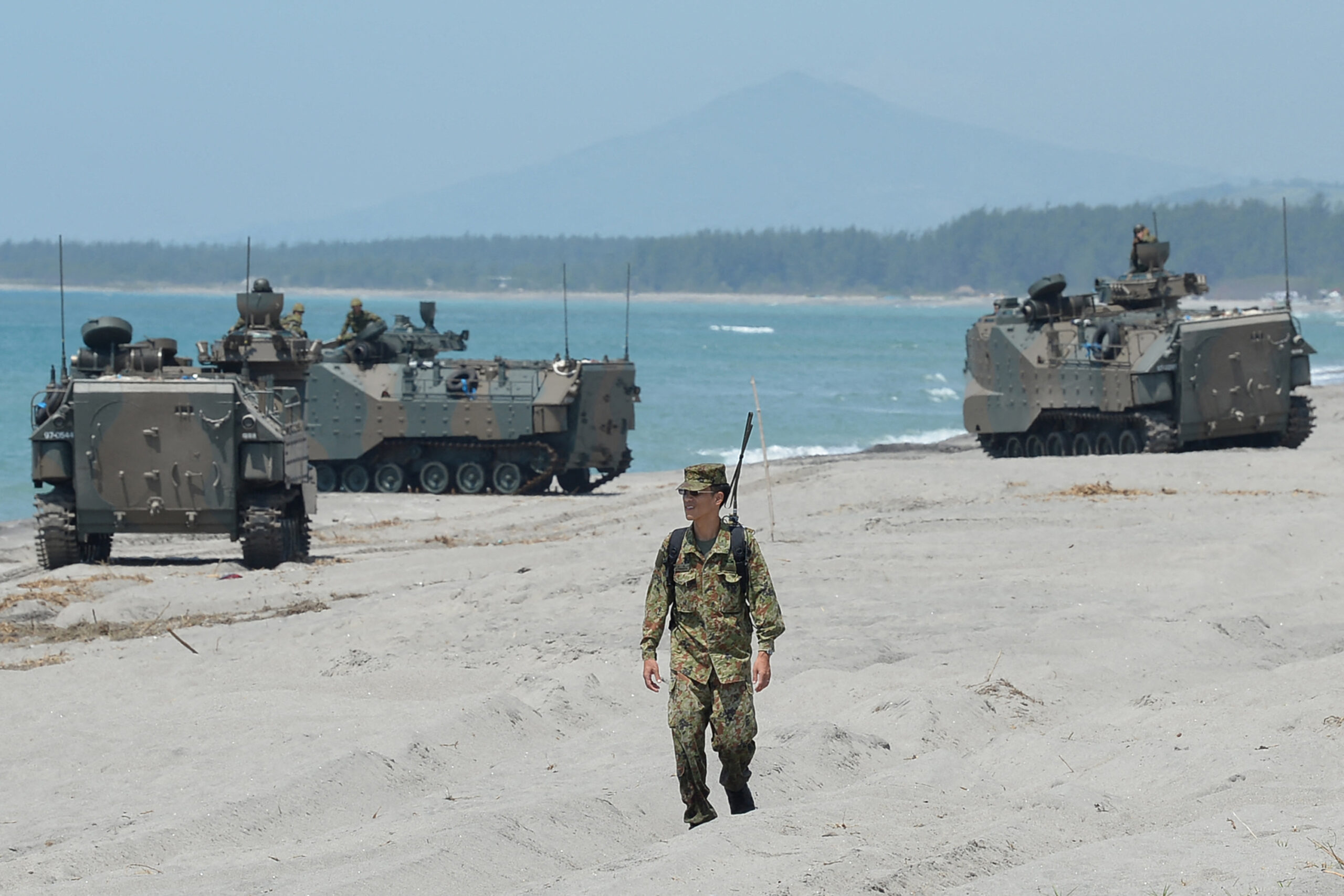West PH Sea: Philippines, Japan on verge of key defense pact

This file photo taken on October 6, 2018 shows a member of Japan’s Ground Self-Defense Force (JGSDF) walking past JGSDF amphibious assault vehicles during a joint amphibious landing exercise with Philippine and US troops in San Antonio, Zambales province, north of Manila. FILE PHOTO/Agence France-Presse
MANILA, Philippines — The Philippines and Japan are set to sign on Monday a key defense pact that will allow the deployment of troops on each other’s territory.
Japanese Defense Minister Minoru Kihara and Foreign Minister Yoko Kamikawa will hold high-level talks with their Philippine counterparts Gilberto Teodoro and Enrique Manalo in Manila.
The Philippines and Japan — longtime allies of the United States — have been deepening defense ties in the face of an increasingly assertive China.
READ: West Philippine Sea: PH hopes to sign key defense pact with Japan
President Ferdinand “Bongbong” Marcos Jr. will witness the signing of the reciprocal access agreement (RAA), which the countries began negotiating in November, the Philippine Presidential Communications Office said.
The accord would provide the legal framework for Japan and the Philippines to send defense personnel to each other’s territory for training and other operations.
Negotiations were “close to conclusion”, Tokyo’s ambassador to Manila, Kazuya Endo, said in a speech on Thursday, as he flagged “significant developments” in Japan’s defense equipment supplies to the Philippines.
READ: Japan and Philippines trying to finish defense pact for signing in Manila as alarm grows over China
The talks follow escalating confrontations at sea between Chinese and Philippine ships as Beijing steps up efforts to push its claims to nearly all of the South China Sea.
The most serious in a number of incidents happened on June 17 when Chinese coast guard personnel wielding knives, sticks and an axe surrounded and boarded three Philippine navy boats during a resupply mission to Second Thomas Shoal in the Spratly Islands.
A Filipino sailor lost a thumb in the clash.
Tokyo and Beijing are also at loggerheads over Japan-controlled disputed islands in the East China Sea.
‘Linchpin’
The RAA was important because it would enable the Philippines “to enhance our interoperability with like-minded partners,” said Manila-based geopolitical analyst Don McLain Gill.
“This would also complement what we are trying to do in terms of enhancing our security partnerships within the US hub and spokes network.”
READ: PH-Japan ties crucial as world faces ‘turning point,’ says top Tokyo envoy
Washington has been strengthening its network of alliances in the Asia-Pacific region to counter China’s growing military might and influence, which Chinese officials have said is a US effort to create a “NATO” in the region.
Leaders from Japan, the Philippines and the United States had their first trilateral summit in April aimed at boosting defence ties in Washington.
It was held on the heels of four-way military drills that included Australia in the South China Sea, riling Beijing.
The Philippines has been a key focus of US efforts to build an arc of alliances, owing to its position in the South China Sea and proximity to Taiwan, which China claims as its own.
Philippine support would be crucial for the United States in the event of any conflict.
Japan, wary about possible future changes in US policy in the region, was also seeking “to play a larger role” as an independent and stabilizing force, Gill the analyst, said.
Tokyo has signed similar reciprocal access agreements with Britain and Australia in recent years.
The Philippines has equivalent pacts with the United States and Australia and plans to pursue one with France.
Japan, which invaded and occupied the Philippines during World War II, is a top provider of overseas development assistance to the country and also a supplier of security equipment.
“The Japanese would like to impress upon the Americans that Japan is the linchpin of US security presence, military presence here in the region, and of course, the most reliable ally of the United States,” said Renato Cruz De Castro, professor for international studies at De La Salle University in Manila.
For comprehensive coverage, in-depth analysis, visit our special page for West Philippine Sea updates. Stay informed with articles, videos, and expert opinions.


















